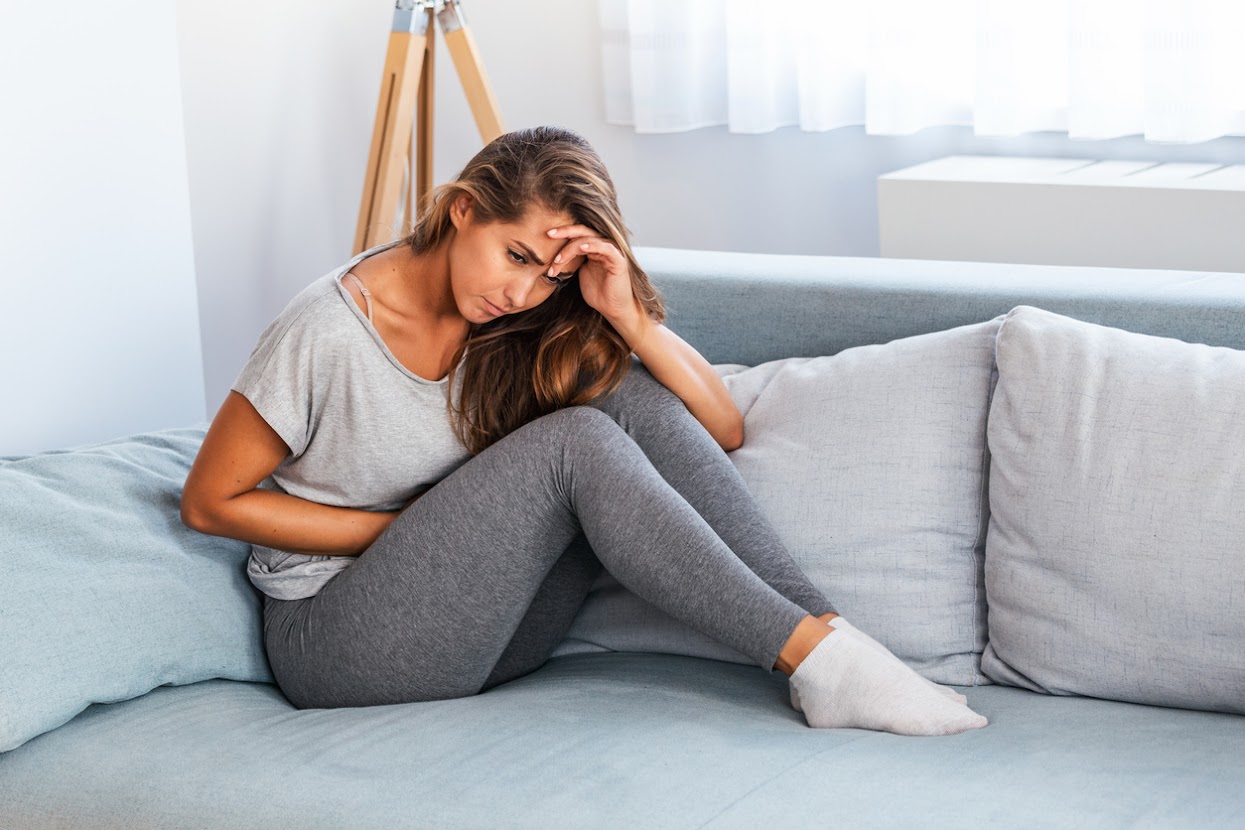Top Warning Sign of Lower Abdomen Pain After Sex

Experiencing pain or discomfort in the lower abdomen during sex is a condition known as dyspareunia. If you’re struggling with this symptom, know you’re not alone. 75% of women have experienced lower abdominal pain during or after sex at some point in their lifetime. Often, this discomfort isn’t anything to worry about and can be caused by various benign factors. However, if the pain persists for over three months, it could indicate an underlying problem.
To accurately determine if your discomfort is linked to sexual activity, it's essential to monitor your symptoms closely. Ask yourself: does the pain occur only after certain meals, during physical activity, or is it exclusively related to sexual intercourse? If you find that your discomfort is specifically tied to sexual activities, it's important to consult a healthcare professional for guidance and to seek a diagnosis.
What Could Be Causing Lower Abdominal Pain During Sex?
Although a doctor is the only professional who can find the route of your problem, common causes for dyspareunia (pain during sex) are the tilted uterus, vaginal dryness, orgasm, and the position in which you have intercourse.
While these causes aren't severe and easily fixed, the symptoms remain uncomfortable, which may make you want to stop having sex altogether. Many of the causes of painful intercourse fall under two categories: gynecological and vascular.
Gynecological Causes of Lower Abdomen Pain
Gynecologists specialize in women’s reproductive health, expertly guiding and caring for their patients from the onset of menstruation through to menopause. These medical professionals conduct thorough examinations of the female reproductive system to ensure its optimal functioning. Additionally, gynecologists are adept at diagnosing and addressing various concerns, including discomfort experienced during or after sexual intercourse. Gynecological causes of lower abdomen pain during sex include:
Urinary Problems
Abdominal pain during or after sex can be caused by various urinary tract issues. Here are some of the possibilities:
Urinary Tract Infections (UTIs): UTIs can cause pain in the lower abdomen during sex. This is due to inflammation and irritation of the urinary tract, which physical movements can exacerbate during intercourse.
Interstitial Cystitis (IC)/Painful Bladder Syndrome: This is a chronic condition characterized by bladder pressure and pain and pelvic pain. The symptoms can vary but often include discomfort during sex.
Bladder Stones: These are hard masses of minerals in the bladder. They can cause discomfort or pain in the lower abdomen during sex, especially if the stones move or cause irritation.
Kidney Stones: While primarily located in the kidneys, these stones can cause significant pain if they move into the urinary tract. Pain can be exacerbated during physical activities, including sex.
Urethral Syndrome: This condition, characterized by an inflamed or irritated urethra, can cause pain during sex, especially during penetration.
Pelvic Inflammatory Disease (PID): Although not a urinary tract issue per se, PID can cause pain in the lower abdomen, which can be mistaken for urinary tract discomfort. It's an infection of the reproductive organs and can affect the bladder and surrounding area.
Endometriosis: Again, while not strictly a urinary tract issue, endometriosis can cause pain during sex. Endometrial tissue can grow on the bladder or urethra, causing pain.
It's important to note that abdominal pain during sex can have multiple causes, not limited to urinary tract issues. They may conduct a physical examination, ask about symptoms, and potentially suggest tests like urinalysis, ultrasound, or cystoscopy to diagnose the problem accurately.
Sexually Transmitted Infections
Experiencing abdominal pain following sexual intercourse can be indicative of sexually transmitted infections (STIs), with chlamydia and gonorrhea being among the most common culprits. Recognizing the symptoms associated with these infections is essential for timely diagnosis and treatment.
Chlamydia, a frequently encountered STI, can present with various signs, including:
- Itching in the pelvic region external to the vagina.
- A discharge that may appear yellow in color.
- Pain localized in the lower abdominal area.
- Menstrual irregularities, such as irregular periods and spotting between cycles.
Gonorrhea, another prevalent STI, may manifest through symptoms such as:
- Increased bleeding during menstrual periods.
- Discomfort or pain during urination.
- Discharge that could be green, yellow, or even blood-tinged.
- Persistent fevers that may indicate an ongoing infection.
For those experiencing these symptoms or concerned about potential exposure to STIs, it is advisable to seek medical evaluation. STI testing is available through various healthcare providers, including primary care physicians and specialized clinics.
Ovarian Cysts
Ovarian cysts are fluid-filled sacs that develop on or within the ovaries. While generally not hazardous, ovarian cysts can lead to discomfort during or after sexual activity, particularly if they are large or ruptured. The pain is typically localized to the pelvis's lower left or right side. Associated symptoms may include lower back pain, a sense of fullness in the lower abdomen, bloating, and discomfort around the lower stomach.
Uterine Fibroids
are benign (noncancerous) growths on the uterine wall. They vary in size, from very small to as large as a grapefruit, and can sometimes occur in clusters. Fibroids can cause discomfort during intercourse, heavy menstrual bleeding, painful periods, and cramps. If fibroids are diagnosed, your healthcare provider will discuss the most appropriate treatment options, including surgical or non-surgical approaches.
Ovulation-Related Pain
Some individuals experience discomfort during ovulation, which is the phase in the menstrual cycle when an egg is released from the ovary. This pain can be more noticeable during sexual activity due to pressure build-up or certain sexual positions. To alleviate this type of pain, consider taking a warm bath or shower after intercourse, experimenting with different positions, communicating openly with your partner, and utilizing sexual aids such as lubricants to enhance comfort.
Vaginismus
This is a condition where there is an involuntary tightening of the vaginal muscles, which can cause pain during sexual intercourse. Vaginismus can be managed through various strategies, including physical therapy, counseling, and specific exercises designed to relax the vaginal muscles.
Other dyspareunia causes may include vaginal dryness, emotional trauma, or your partner's penis may be too large for you.
It isn't unusual for you to be allergic to your partner's sperm. Although allergies to sperm are rare, almost 40,000 women across the US experience sperm allergies.
Vascular Causes for Lower Abdomen Pain During Sex
If you are experiencing persistent lower abdominal pain following sexual intercourse for a duration of six months or more, you may be suffering from a vascular condition known as Pelvic Congestion Syndrome (PCS). This syndrome is characterized by varicose veins in the pelvic region, essentially enlarged and twisted veins around the pelvic organs.
The symptoms associated with pelvic congestion syndrome are diverse and include:
- Persistent pelvic pressure or discomfort lasting more than six months.
- Increased pain or discomfort during menstrual cycles.
- Swelling of the vagina, labia, or perineal area.
- The presence of noticeable varicose veins in the pelvic, vaginal, or upper thigh regions.
- A tendency to urinate frequently.
- Leg pain that coincides with the menstrual cycle.
- Pain in the lower back and hip areas.
- Dyspareunia or lower abdominal pain during intercourse.
When To See a Vascular Specialist, not a Gynecologist
Vascular specialists are experts in managing the health of veins, arteries, blood cells, and the overall circulatory system. If you're experiencing lower abdominal pain during sex, the issue may be related to your vascular health rather than gynecological causes. This pain could be a result of varicose veins in the thigh or vaginal area or due to insufficient blood flow in the pelvic region. Inadequate blood flow can lead to blood pooling, causing symptoms like discomfort during sex, prolonged standing or sitting, and even during menstrual cycles.
A vital indicator of a vascular issue is when pelvic pain eases upon lying down.
If you have persistent pelvic pressure lasting over six months, and a gynecological assessment has ruled out conditions like UTIs, endometriosis, ovarian cysts, or other gynecological issues, it may be time to consult a vascular specialist. This is especially true when all other gynecological, musculoskeletal, and fracture-related causes have been excluded, yet severe groin pain persists for six months or more.
Center for Vascular Medicine recommends a gynecological evaluation, but it's not mandatory before seeking vascular care for pelvic varicose veins.
Be aware of these warning signs:
- Painful or heavy menstrual cycles.
- Unresolved issues by an OBGYN.
- Pelvic pain, heaviness, pressure, aching, bloating, or a heavy feeling in the groin.
- Visible varicose veins in the pelvis, labia, or legs.
However, it's essential to consult a gynecologist if you experience any of the following:
- Severe pain prevents sexual intercourse.
- Avoidance of arousal due to fear of pain.
- Daily activities are disrupted by pain.
- Intense pain during menstruation or accompanied by other symptoms.
If lower abdominal pain after sex persists beyond three months, seek advice from a gynecologist. A vascular specialist's consultation is advisable after six months with no diagnosis and worsening symptoms. Addressing sexual pain promptly is crucial for maintaining sexual health.
Contact Center for Vascular Medicine
Persistent lower abdominal pain after sex should not be part of your routine. A gynecological consultation is recommended if you've been facing this issue for over three months. For symptoms lasting more than six months, consider a vascular specialist. At Center for Vascular Medicine, we're committed to your well-being and are ready to help you navigate these concerns with care and expertise.
Contact us today to schedule a consultation and take the first step toward understanding and addressing your pain. We serve patients from Annapolis, MD, Columbia, MD, Easton, MD, Glen Burnie, MD, Greenbelt, MD, Prince Frederick, MD, Silver Spring, MD, Waldorf, MD, Fairfax, VA, Fredericksburg, VA, New Brunswick, NJ, and Union, NJ.

